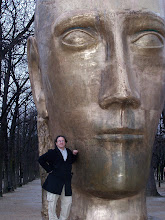After a long hiatus, I am back blogging about music. I am going to try keeping up with all of my musical adventures for 2012, at least until the Mayan calendar runs out. I am calling this post "Megabus new music tour part 2" (perhaps I will go back and write about part one later). Pittsburgh, being a Megabus hub, is situated in an excellent spot to travel for next to nothing ($2.50 if you are quick about booking) and experience the wonders of new classical music in the eastern and upper mid U.S.
This trip included a visit with my robust friend Adam and his family (Eileen and little Sam). Adam being a ready partner for new music made this extra fun.
The National Symphony opened their show with Debussy Preludes, orchestrated from their piano origins by Colin Matthews. By an interesting coincidence, I know of Colin Matthews only through the Violin Concerto he wrote for this evening's soloist, Leila Josefowicz. I know the original piano versions of the Preludes though not particularly well. I was struck by the way in which they sounded like Debussy (though I guess they should, shouldn't they?). I assume that has do do with Matthew's study of Debussy and his own orchestrations of his own work. I enjoyed the performances without being terribly drawn in by them. Hannu Lintu, a tall thin Finnish conductor, was clean and concise with his movements.
The second piece in the first half of the program was the Steven Mackey's Violin Concerto "Beautiful Passing". This was played by Leila Josefowicz, for whom the piece was written. This was NOT a premiere performance other than it being a first in Washington and with the NSO. One of the things that is great about Leila Josefowicz is that she truly supports the contemporary pieces she takes up. She has already played the piece at Princeton (where Mackey teaches), in Los Angeles, London and Saint Louis. The Beautiful Passing title came from his dying mother's request to her son to "Tell everyone I had a beautiful passing."
The naming and story going with this piece has gotten me thinking about how extra musical things enter into the experience of musical and instrumental pieces. This was once rare for concertos but now has become quite common. The Berg Violin concerto being about Mannon Gropius' untimely death. Rihm and Gubaidulina have each named their two Violin Concertos but not numbered them. In this case we have a name and a specific real life event for the composer. A story that goes with a piece can also become part of the experience, such as the famous and largely erroneous story about the Barber concerto, for example. In addition, Leila Josefowicz did the now perfunctory explaining of the new music before performing it. I do like this and in this case she connected particular passages with actual events. Specifically, certain solo violin passages mimicking Mackey's mother's labored breathing. All of this definitely changes the way I experienced the piece. It is also clearly part of the marketing (and I do not mean that in a pejorative manner as I do hope for classical music to connect with people).
The concerto itself is one movement of about 22 to 23 minutes. A cadenza in the middle divides the piece roughly in half. The solo violin starts with long sustained notes, not really allowing for any virtuosity. The orchestra starts loudly and violently, then moves variously with and against the long lines of the soloist. An interlude, about 7 to 8 minutes in has the soloist playing high shimmery notes, the orchestra again moving with then against the soloist. The cadenza again does not really do what a normal cadenza would do in the sense of virtuoso showing off. It does explore the long lines and high shimmery notes and ends with high fast notes. The orchestra opens, post cadenza, with intense low notes, quite dramatic. This last part of the piece is more accessible than the first half. Interesting from a rhythmic perspective, lots of contributions from a prominent solo piano and with lush orchestrations. I enjoyed the playfulness that shifted the mood briefly in what is a mostly somber and melancholy piece. So was the passing (ending) of the piece beautiful? Yes I would say and ethereal. A nice addition to the repertoire.
The Sibelius Fifth Symphony comprised the second half the the concert. This is a favorite of mine, a piece with which I am quite familiar. I thoroughly enjoyed Mr. Lintu's reading of the piece. Not as grand as some but he moved it along well, holding together all of the fragments that Sibelius assembled. He built the climaxes well through the piece, the end of the first movement and the various climaxes in the last movement. The Sibelius Fifth symphony does have the weirdest ending of any symphony I know. Lintu brought this off well, not hurrying through the strange pauses.
Saturday, February 4, 2012
National Symphony Orchestra, Leila Josefowicz, Hannu Lintu - January 14, 2012
Labels:
Debussy,
hannu Lintu,
Leila Josefowicz,
Mackey,
Matthews,
National Symphony,
Sibelius
Subscribe to:
Post Comments (Atom)

No comments:
Post a Comment